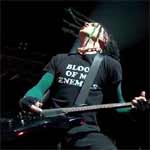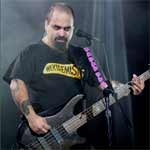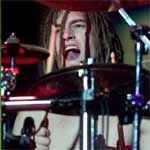 Many of the bands that burst onto the metal scene in the mid to late nineties are already finding it difficult to sustain a career within the restrictive musical form that came to be known as nu metal. By most accounts, Wisconsin Death Trip was a quality album that continues to entertain listeners even today. The follow up, Machine, was received less than enthusiastically, and the jury is still out in many ways regarding the bandís new project Shadow Zone. Whether or not the groupís music has actually decreased in quality or whether Static X has simply become a member of a moribund scene depends on who you ask. Itís undeniable though that Wayne Staticóthe singer and linchpin of this band-- is the person who will be blamed if the style or even the substance of the group eventually fails. Maybe recognizing certain limitations inherent in his groups repertoire, it now seems that Wayne is attempting to expand his otherwise limited vocal range in an effort to push the parameters of what Static X is and can beóif anything at all.
Many of the bands that burst onto the metal scene in the mid to late nineties are already finding it difficult to sustain a career within the restrictive musical form that came to be known as nu metal. By most accounts, Wisconsin Death Trip was a quality album that continues to entertain listeners even today. The follow up, Machine, was received less than enthusiastically, and the jury is still out in many ways regarding the bandís new project Shadow Zone. Whether or not the groupís music has actually decreased in quality or whether Static X has simply become a member of a moribund scene depends on who you ask. Itís undeniable though that Wayne Staticóthe singer and linchpin of this band-- is the person who will be blamed if the style or even the substance of the group eventually fails. Maybe recognizing certain limitations inherent in his groups repertoire, it now seems that Wayne is attempting to expand his otherwise limited vocal range in an effort to push the parameters of what Static X is and can beóif anything at all.
At this point, it is difficult to say whether this band has either the talent or charisma to carry on for another ten years, but it is hard to believe that this group will survive if it proves unable to shake the perception that they are simply trying to recapture the success of their debut. For the first time Wayne has acquiesced to the idea of having a writing partner, guitarist Tripp Eisen, although the substantive differences in the music arenít so great that the listener will become confused by the direction the group has taken. In a situation like this, small steps may be the only way boundaries can be expanded without alienating existing fans. Maybe a better question is whether or not Wayne can continue to show up on the X Games with his hair pointed to the sky without running the risk of becoming a caricature of himself or merely being perceived as the leader of a band that creates video game soundtracks.
 KNAC.COM: It has been said that your group has great diversity in its influences. What common thread though do you see running through bands like Joy Division, Sisters of Mercy and Pantera?
KNAC.COM: It has been said that your group has great diversity in its influences. What common thread though do you see running through bands like Joy Division, Sisters of Mercy and Pantera?
WAYNE: Thereís definite darkness thereónot the band The Darkness, but you know. Thatís the common thread I see between all the bands that I would say were the influences for us. I mean, it goes all the way from their lyrics to the musical keys they choose to write in and things of that nature.
KNAC.COM: What would compel somebody to not only write in that manner, but to be drawn to it as a fan?
WAYNE: I donít know. A lot of people are--I always have been anyway. I donít know. Maybe some people can just identify with other peopleís misery.
KNAC.COM: Do you think it always reverts back to the idea that music can serve as a catharsis for the listener? Does it make them feel better to know that others feel worse?
WAYNE: Thatís always been the way itís been for me. I mean, when Iím in a bad mood, I just feel better listening to someone else who sounds like theyíre in a bad mood. That was especially true when I was a kid, and I was mad at my mom or dad for whatever reason. Listening to Ozzy at full blast always made me feel a little bit better. I think it made me feel like I wasnít alone. I guess its human nature.
KNAC.COM: With Ozzy having become such a mainstream phenomenon, does it effect the way you view his music now or can you enjoy it just as much today as you did then?
WAYNE: Well, in Ozzyís case, I havenít liked anything heís put out since his second solo record. The rest of it doesnít really matter to me. Ozzy is what he is now, and I respect him for what he has done. In other cases though, if I liked a bandís music, but then they turned out to be these goofy people, it might change my mind a little bit. I donít know. Music is what it is, man. Even if someone turned out to be a complete asshole, the music still came out of them.
KNAC.COM: Did you ever have a situation where that happened to you? Someone turned out to be less than you thought they were?
WAYNE: Not really, everyone has pretty much turned out to be cool.
KNAC.COM: Really?
WAYNE: Yeah, and Iíve pretty much met everyone Iíve ever wanted to meet except a lot of the English bands I used to listen to like the Cult, and most of them arenít around anymore to meet. Iíve met KISS and Rushówho were also a big influence on me when I was youngópretty much everyoneís been cool. You donít get far in this business if youíre a dick, you know.
KNAC.COM: You really believe that?
WAYNE: Yeah, because people donít like working with dicks, and they donít like helping them out either. A lot of this business is who you know. People do favors for you, and you do favors for them. Itís how the whole world turns, so you know, guys that are assholes donít last too long.
KNAC.COM: That would seem especially true when it comes to creating touring packages like Ozzfest where if you get along and do well one year, youíll probably get invited back when you tour for the next album as well.
WAYNE: You gotta think that way. You gotta think realistically about your future, and thatís just the way it is.
 KNAC.COM: For example, this isnít the first time youíve toured with Soil. Whatís your relationship with that band besides the Chicago connection?
KNAC.COM: For example, this isnít the first time youíve toured with Soil. Whatís your relationship with that band besides the Chicago connection?
WAYNE: Well, Iíve known Shaun [Glass], the guitar player, for years. He used to play in this crappy metal band called Syndrome while I was playing in my own crappy metal band as well, so Iíve known him for a long time. When I heard Soil a few years back, I loved it. They are just a great bunch of guys. It worked out when I took them out on tour last time, so I brought them back out again.
KNAC.COM: Do you believe in the curse of the Cubs?
WAYNE: Man, I always hated the Cubs, and I used toó
KNAC.COM: So you cursed them!
WAYNE: No, I used to pray for them to lose so they wouldnít go into the post season because we had a rehearsal space right next to the field, and when there was a game, the cops wouldnít let you pull up to get out your gear. You were just screwed. Youíd have to plan to get your gear out a couple of days before the game, so I was always like, ďOh man, Cubs, lose and get this season over with!Ē I just wanted to be able to load my gear when I wanted.
KNAC.COM: You realize that 65-year-old women all over the city cry each year when the Cubs are eliminated though, donít you?
WAYNE: Who cares? Thereís nowhere to park.
KNAC.COM: The brutal Chicago winters are said to have been one of the reasons you left the city for California. Looking back, what influence do you think coming from the Windy City had on you?
WAYNE: Itís hard to tell. One thing is for sure though; the industrial scene was thriving in Chicago at the time I was getting to a pretty influential age. Our music probably wouldnít have had as much of an industrial edge if I was in California.
KNAC.COM: Does that mean Al Jourgensen and Ministry were a huge influence?
WAYNE: Yeah, I know them. I wouldnít say that weíre great friends or anything. Iíve talked to Paul a little bit more, but I met those guys back before Paul was even in the band.
KNAC.COM: At what point did you decide that you were going to look to music as a lifestyle as well as a career?
WAYNE: Well, when I was 7, I discovered KISS. That was it.
KNAC.COM: Really?
WAYNE: That was it. I played the guitar and started my first band when I was 12 with my buddies from the neighborhood. Thatís when I knew that this is what I wanted to do.
KNAC.COM: Was it the massive theatricality and persona of KISS that made it so attractive?
WAYNE: Yeah, it was the whole thing about the huge larger than life thing. They were just putting on this big show and all of that. Itís just always been what Iíve had in mind. KISS is that band that instilled that in me.
KNAC.COM: The book entitled ĎWisconsin Death Tripí that you named your debut after is thought to have been based on disturbing imagery. Do you still have that? Is it true that it was picked up at a flea market?
WAYNE: Actually, it was my sisterís book, and I was living with her at the time while going to school in Kalamazoo, Michigan a long time ago. She had the book, and the name just always stuck with me. It just had this ring to itóthis dark allure to it. We were going to name the band that actually, but our manager thought it was a bit too long for radio and blah, blah, blah. I guess you have to think about those things. We got to name the album that anyway. I donít even have my own copy of the book.
 KNAC.COM: Was it the fact that the images were in black and white that made the pictures so stark and haunting?
KNAC.COM: Was it the fact that the images were in black and white that made the pictures so stark and haunting?
WAYNE: They were photos taken from between 1880 and 1890 of everyone who died in this town of Black River Falls, Wisconsin. Each person who died had little picture of them. Some of them were pictures of the people after they were dead, and some were just family photos. Next to the pictures were little stories about them and how they died. That was the just what the whole thing was. It kind of looked like newspaper inserts and photos.
KNAC.COM: So there was no common thread between these people other than they happened to be from the same town?
WAYNE: Yeah, it was just sort of a chronicle of these people who happened to die in that town. It was really interesting though to see how people died back then. Back then, colds killed people, and a lot of others went insane and things of that nature. Times just seemed really tough back then.
KNAC.COM: People never seem to think about small town folk going crazy either.
WAYNE: Well, back then, all kinds of people went insane for whatever reasons. I donít know. [laughs]
KNAC.COM: Who would have figured things would have been that complicated for them?
WAYNE: Well, it was freezing cold there. Can you imagine making it through winters during those times?
KNAC.COM: No, no.
WAYNE: Nothing but a fireplace.
KNAC.COM: Itís bad enough here, and Iím sure this is nothing compared to Chicago either. How did you feel about coming up with the lyrics to some of the songs on the new album but not having to compose the music?
WAYNE: It was a lot of fun for me. I never had the opportunity to do that before. I always just wrote the music and basically did the whole song, so this kind of opened up doors for me to think about the vocals in different ways. Normally, when Iím writing a song, Iím thinking of the whole song. Then, to hear somebody elseís music, it really was a whole different way of thinking for me. I enjoyed it. It was a lot of fun. Trippís a very talented writer. Iíve never had another songwriter in the band before either. I think it really helped out, and weíve been working on a lot of other stuff too.
KNAC.COM: Do you think itís a good thing that this collaboration with Tripp came during your third album? Would you have been as receptive to this happening a few years ago?
WAYNE: Absolutely.
|
"We love to perform every night, and that is important for a band like us that doesnít get tons of radio play. Itís important for us to go out and tour and spread the word."
|
|
KNAC.COM: So you wouldnít consider yourself a control freak or anything like that?
WAYNE: Iím not one of those egotistical guys at all. You know, I see myself as the leader of the band, but that doesnít mean Iím not open to input from all members. I was the only songwriter on the other albums, but everyone contributed. I was always open to ideas and this and that. Iím the kind of person who wants things as good as they could be. If someone has something they can contribute to the song and can make it better, then that is great with me.
KNAC.COM: Is that role better suited to the vocalist than the other members of the band?
WAYNE: Well, no, not necessarilyólook at Motley Crue. In that group, itís the bass player. I mean, itís just important that you have someone there to try to keep the vision. You need to keep true to the vision as youíre going through your career. I mean, maybe some bands donít need that, but most seem to need someone to keep things focused.
KNAC.COM: It has got help when everyone in the group agrees as to who that person is.
WAYNE: Yeah, wellÖ egos come to play, but not in this band.
KNAC.COM: Does that just mean youíve been really lucky?
WAYNE: Yeah, well all the guys who had egos are out of the band now.
KNAC.COM: Is that to say you have a really low tolerance level for those around you who arenít working toward the common goal?
WAYNE: Exactly. Exactly. Thereís no drama in this band. Thereís no egos. We just all get along. We just all realize that weíre here to do the job, and thatís the way it is.
KNAC.COM: You mentioned KISS earlier, but what influence did the Ď80s have on you with Headbangerís Ball and the traditional metal that was available at that time? I know you co-hosted the show just recently.
WAYNE: Yeah, I guest-hosted Headbangerís Ball. It introduced me to a lot of bands at the time. At the time, I was more interested in more gothic or industrial type of stuffóI wasnít really listening to too much metal. It kind of reintroduced me to metal and bands like Prong and Megadeth. It was a cool show.
 KNAC.COM: So you werenít in any way taken with the glam metal that was also being produced at the time?
KNAC.COM: So you werenít in any way taken with the glam metal that was also being produced at the time?
WAYNE: Yeah, I never really got into any of that stuff.
KNAC.COM: How would you say that you view touring versus the act of recording a new record?
WAYNE: I hate recording records. I like writing songs, but recording is just very grueling and not very enjoyable at all. Obviously, the road is awesome. This is why we got into this in the first place. We love to perform every night, and that is important for a band like us that doesnít get tons of radio play. Itís important for us to go out and tour and spread the word.
KNAC.COM: Which is cooleróplaying a to a stadium filled with people who may be there to see someone else, or playing to a packed club in the wintertime?
WAYNE: Iíd rather play a stadium any day.
KNAC.COM: What changes the most in your show between the two? Is it your movements? Your stage set?
WAYNE: Thatís part of the reason I donít like playing small venues is because you canít put on a proper show in a club. You might as well just be a bar band. Thereís no room to run around. Thereís minimal lighting, and the sound is usually half-assed. The whole reason I got into this was to put on a big show. When we were out on the ĎFamily Valuesí Tour, and we got full production and a big stage to run on, itís just way better. Our show just has more energy to it. I understand why the fans would prefer to see a show in a smaller venue, so thatís why we also continue to do this type of a thing as well, but itís tough. Being onstage in a small venue with all the people, and its just this gross, tiny sweatbox, and youíre just up there trying to do your show without passing out because thereís no air conditioning. Dude, Iíll take an arena tour any day.
KNAC.COM: Thatís at least an honest answer. Normally the artist will say they prefer the smaller venues because theyíre closer to the fans.
WAYNE: Thatís the only good part about it. Everything else sucks. There are no dressing rooms. No place to take a shit.
KNAC.COM: Whatís a venue without a place to take a shit, huh?
WAYNE: An uncomfortable one.
(Photos from StaticX.com/ Ethan Miller)




